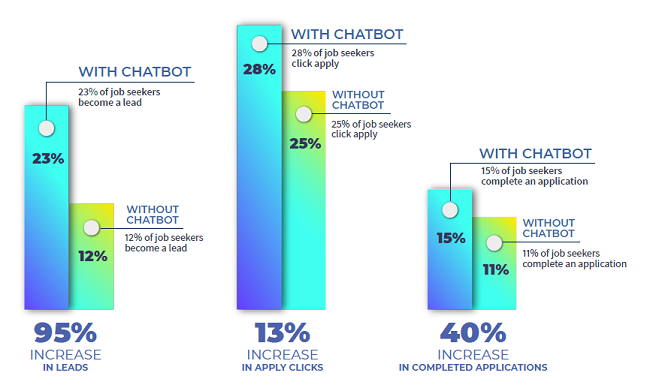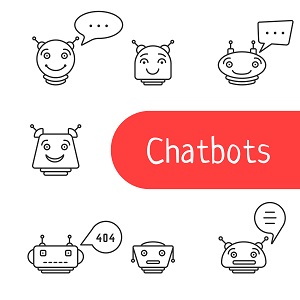Talent departments are spending $250 billion on recruitment, interviewing and candidate assessment solutions. But as employers invest in these disparate technologies, they sacrifice efficiency and deliver a disconnected experience throughout the talent lifecycle.
Enter the AI chatbot. Phenom, a leader in Talent Experience Management (TXM), is a single platform that individualizes the end-to-end talent journey for candidates, recruiters, employees and management. The company recenlty released its report, Chatbots for Recruiting: 2020 Benchmarks, which analyzes more than 20 million chatbot interactions from over 100 Phenom Bot deployments. The report showcases how career sites with chatbots convert more applicants and nearly double the number of candidate leads.
According to the report, chatbots play a significant role in the candidate journey, validating the need for organizations to adopt and implement them during the hiring process. In one use case, a healthcare company experienced a 1,142% increase in candidate leads in the first 30 days.

Key findings include:
Chatbots on career sites convert more candidates than those without:
- 95% more job seekers become leads
- 40% more job seekers complete an application
- 13% more job seekers click apply on a job requisition
Highest chatbot engagement occurs outside of traditional 9am to 5pm business hours:
- 66% of total chatbot interactions
- 60% of completed applications
- 48% of apply clicks
The most common topics candidates ask chatbots:
- Apply & application status
- Benefits & compensation
- Job search
“Today’s talent demands a seamless journey throughout their experience, from job seeker to employee advocate,” said Mahe Bayireddi, CEO and co-founder at Phenom. “To achieve this, employers have to attract, activate and acquire the next wave of top talent—and then upskill, enrich and retain them. With talent experience management, it all happens in a unified, omni-channel platform.”
The Massive Data Set that Enables & Trains Phenom AI
Powered by the observations of 3 billion events per year, a network of over 100 million candidates, 8 thousand recruiters, 2 million employees, and 20 million job openings, observations are turned into 10 thousand markers. These markers are used to develop over 360 talent signals, which are key to making AI impactful and real.
The 3 Core Areas that AI Impacts (How AI Works)
AI and machine learning help candidates, recruiters, employees, and management enhance their experiences in three areas: personalization, search and insights.
- Personalization: Delivers tailored content throughout the entire talent lifecycle. For candidates, AI powers personalized experiences with job recommendations and dynamic content based on their profile, search history, similar jobs openings, similar personas and locations. For employees, AI powers the same personalization features as external candidates, along with career pathing and supplying job referrals from their networks. For recruiters and management, AI powers a personalized pipeline with matching skills and compatibility so recruiters automatically discover new talent and rediscover past quality candidates.
- Intelligent Search: A candidate’s ability to find the right job depends on the career site’s ability to deliver accurate, relevant job results. Search that provides irrelevant and inconclusive results leads to low talent conversion rates for organizations. Instead, search must be intelligent enough to understand the intent and context of a candidate’s inquiry, as well as the relationship between words. Also known as semantic search, this type of search functionality seeks to understand language the same way a human would. The ability to match the right job to the right candidate is critical to converting top talent. AI powers spell correction, prediction, synonyms and natural language processing in order to provide the most relevant search results.
- Actionable Insights: Talent leaders have long struggled with data quality and reliability. AI-driven insights provide fit and engagement scoring, which allows teams to discover new job seekers, rediscover existing candidates, tap into cloud-sourced suggestions, understand candidate intent, obtain trends in the pipeline and view dynamic talent pools. In addition, insights allow recruiters to spend more time with the most qualified candidates, reducing time-to-hire and cost-per-hire.
What AI Solves for the HR Industry
Just like Amazon has mastered recommendations for products, Netflix for entertainment, and Spotify for music discovery, Phenom is doing the same for the HR industry by leveraging AI and machine learning. By connecting billions of data points and millions of interactions from candidates, recruiters, employees, and managers, our technology is able to help candidates find jobs faster, recruiters predict talent pipelines, employees discover career paths, and management optimize recruiting and retention strategies.
There are two types of data sets that when combined, fuel AI to match the right opportunity to the right person. For example, in talent acquisition, we extract key information from job descriptions and candidate profiles and match them with reliability and accuracy. In this case, criteria from the job description—required skills, experience and education levels, and location—are processed and matched to the candidate’s profile on a deeper level. From there, candidates convert on the most relevant openings and recruiters search their pipelines of the most qualified talent.
Chatbots Deliver Personalized Experiences with AI & Machine Learning
The company’s chatbot technology—which has captured 20 million candidate interactions over the course of 12 months—relies on AI and machine learning to provide talent with accurate and relevant job recommendations. Leveraging a master database of information, the chatbot uses both natural language processing and natural language understanding to ensure it comprehends the intent behind a candidate’s question and serves accurate answers. In HR, this is a complicated matter. Recruiters empower the bot further by analyzing the job seekers’ conversations and supply it with additional responses that satisfy their inquiries.

Contributed by Daniel D. Gutierrez, Managing Editor and Resident Data Scientist for insideAI News. In addition to being a tech journalist, Daniel also is a consultant in data scientist, author, educator and sits on a number of advisory boards for various start-up companies.
Sign up for the free insideAI News newsletter.





Really great thoughtful Information